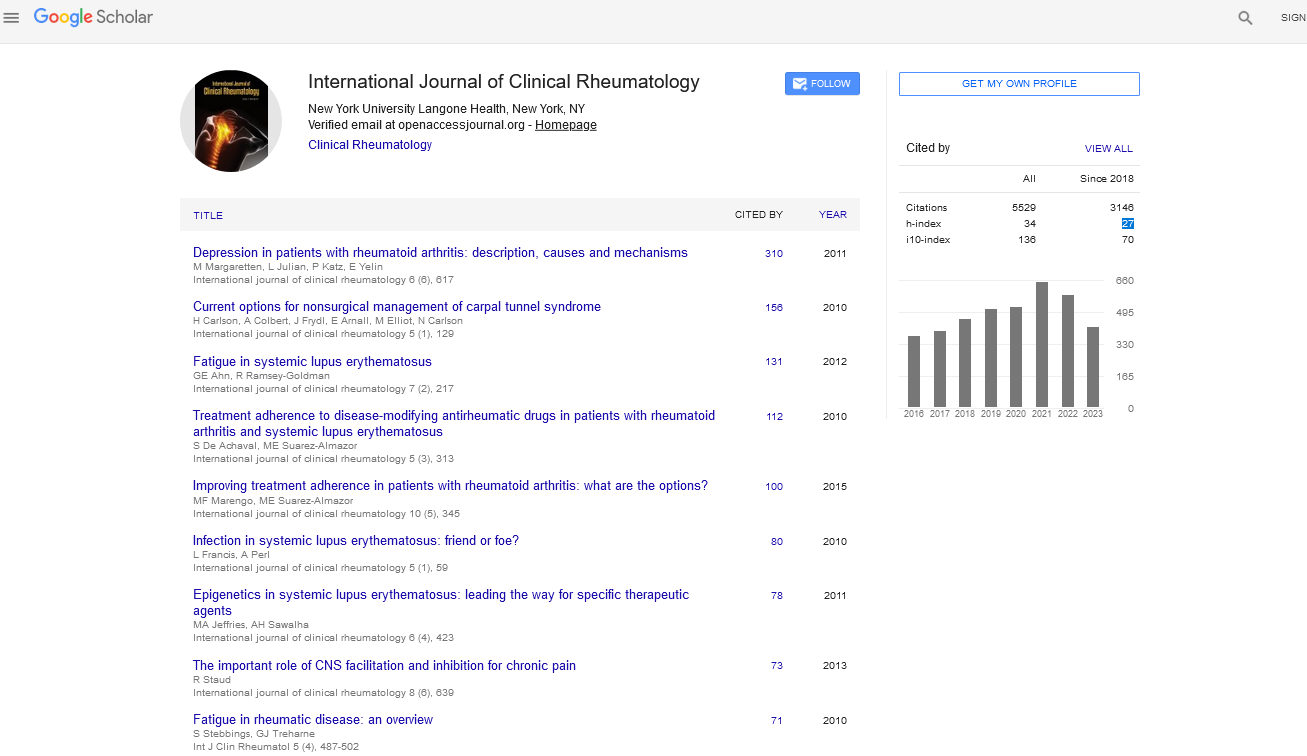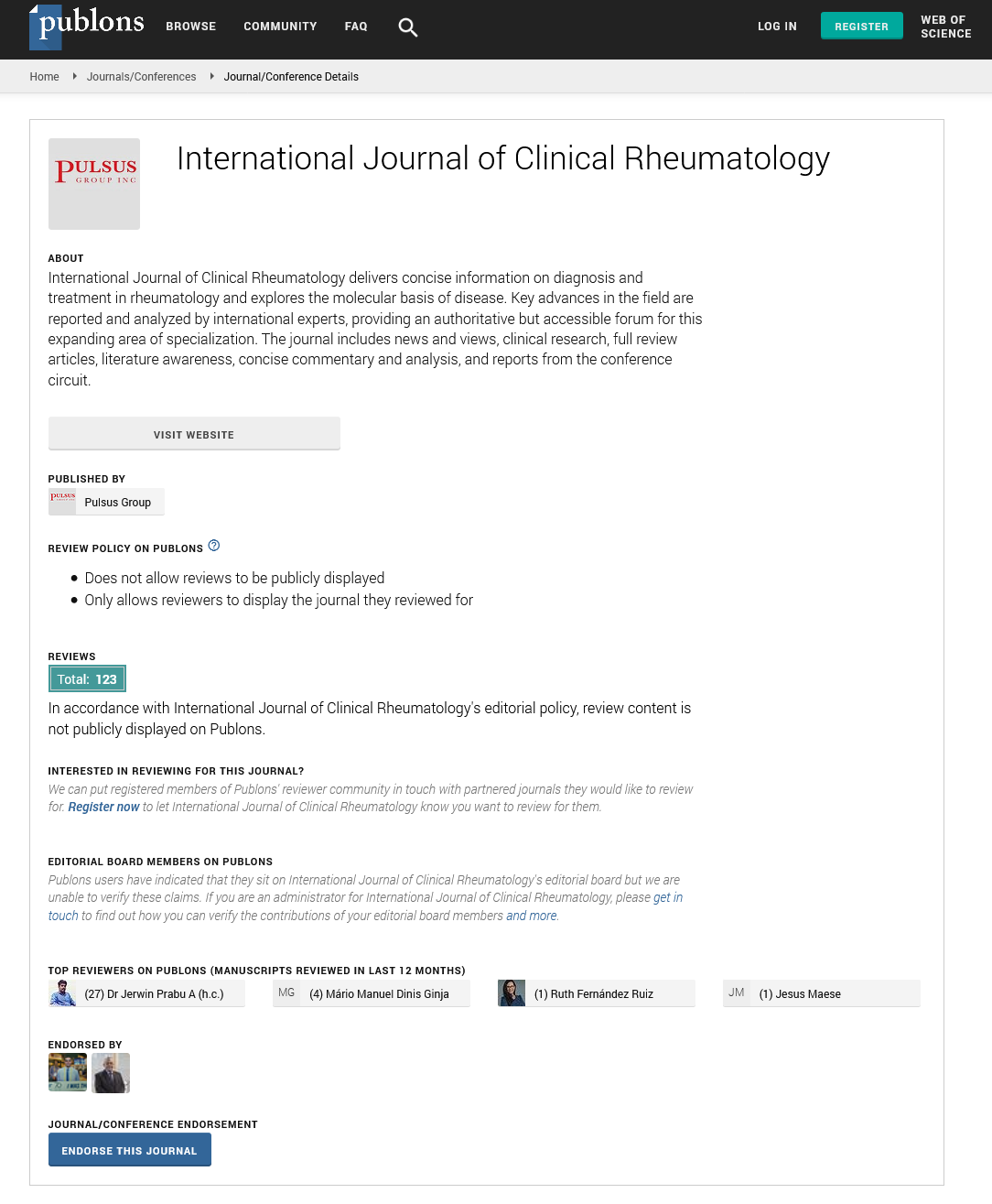Perspective - International Journal of Clinical Rheumatology (2024) Volume 19, Issue 11
Efficacy of Janus Kinase Inhibitors in the Treatment of Psoriatic Arthritis: A Systematic Review and Network Meta-Analysis
David Brooks*
Division of Rheumatology, University of São Paulo, São Paulo, Brazil
- *Corresponding Author:
- David Brooks
Division of Rheumatology, University of São Paulo, São Paulo, Brazil
E-mail: david.brooks1985@outlook.com
Received: 02-Nov-2024, Manuscript No. fmijcr-25-157437; Editor assigned: 04- Nov-2024, Pre-QC No. fmijcr-25-157437 (PQ); Reviewed: 18-Nov-2024, QC No. fmijcr-25-157437; Revised: 23-Nov- 2024, Manuscript No. fmijcr-25-157437 (R); Published: 30-Nov-2024, DOI: 10.37532/1758-4272.2024.19(11).336-339
Abstract
Psoriatic arthritis (PsA) is a chronic inflammatory arthritis that can lead to joint damage and disability. Janus kinase (JAK) inhibitors have emerged as promising oral therapies for PsA, but their comparative efficacy remains unclear. This systematic review and network meta-analysis evaluates the efficacy and safety of JAK inhibitors, including tofacitinib and upadacitinib, against biologic therapies and conventional DMARDs. Our results demonstrate that JAK inhibitors have comparable efficacy to biologics in controlling disease activity and improving physical function, with a favorable safety profile. However, the review highlights the need for long-term safety data to guide their use in clinical practice.
Keywords
Psoriatic arthritis● Janus kinase inhibitors● Tofacitinib● Upadacitinib● Biologics● Efficacy● Safety● Network meta-analysis
Introduction
Psoriatic arthritis (PsA) is a chronic, inflammatory, and multisystem autoimmune disease that affects both the skin and joints. It is a type of inflammatory arthritis that can cause joint pain, swelling, stiffness, and damage, often associated with psoriasis, a skin condition characterized by red, scaly patches. PsA can also affect other organ systems, including the entheses (sites where ligaments and tendons attach to bone), spine, and nails. With an estimated prevalence of 0.1% to 0.3% in the general population, PsA significantly impairs quality of life and is a leading cause of disability. The treatment of PsA involves a range of therapeutic strategies aimed at controlling inflammation, preventing joint damage, and improving quality of life [1]. Traditional treatment options include nonsteroidal anti-inflammatory drugs (NSAIDs), disease-modifying antirheumatic drugs (DMARDs), and biologic agents, such as tumor necrosis factor (TNF) inhibitors and interleukin-17 (IL-17) inhibitors. However, a significant portion of patients may not respond adequately to these therapies or experience adverse effects. This has led to the exploration of Janus kinase (JAK) inhibitors, a newer class of oral targeted therapies that interfere with intracellular signaling pathways responsible for inflammation. JAK inhibitors, including tofacitinib, upadacitinib, and filgotinib, have shown efficacy in other inflammatory conditions such as rheumatoid arthritis (RA) and ulcerative colitis. The efficacy of JAK inhibitors in PsA has been studied in clinical trials, with promising results. However, given the variety of available treatment options and the need for evidence-based guidance, a comprehensive analysis of the efficacy of JAK inhibitors in PsA is warranted. This systematic review and network meta-analysis aim to assess and compare the effectiveness of JAK inhibitors in treating PsA by analyzing long-term clinical outcomes such as improvement in joint symptoms, quality of life, and adverse effects [2].
Discussion
Mechanism of Action of Janus Kinase Inhibitors
Janus kinase inhibitors are a class of targeted therapies that block the JAK-STAT (signal transducer and activator of transcription) signaling pathway, which plays a critical role in the immune response. This pathway is involved in the activation of several pro-inflammatory cytokines, including interleukins (IL-2, IL-6, IL-23) and interferons, which contribute to the inflammatory processes observed in conditions like PsA. By inhibiting JAK enzymes (JAK1, JAK2, JAK3, and Tyk2), these inhibitors prevent cytokine signaling, thus modulating the immune response and reducing inflammation. Tofacitinib, upadacitinib, and filgotinib are the three main JAK inhibitors studied in PsA. Tofacitinib is the first JAK inhibitor approved by the U.S. FDA for PsA, and it has demonstrated efficacy in improving joint pain, stiffness, and inflammation in patients with PsA, particularly in those who are inadequate responders to TNF inhibitors. Upadacitinib and filgotinib, both selective JAK1 inhibitors, have also shown promising results in clinical trials, demonstrating superior efficacy in managing PsA symptoms with a relatively favorable safety profile. In PsA, JAK inhibitors have shown significant improvements in several key endpoints, including the American College of Rheumatology (ACR) response criteria, which assess the reduction in joint inflammation, tender and swollen joint counts, and physical function. Moreover, these medications are typically administered orally, providing an advantage in terms of patient convenience compared to biologic therapies, which often require subcutaneous or intravenous administration [3].
Efficacy of Janus Kinase Inhibitors in Psoriatic Arthritis
Several clinical trials have assessed the efficacy of JAK inhibitors in PsA, showing positive results. The results of randomized controlled trials (RCTs) indicate that JAK inhibitors, such as tofacitinib, upadacitinib, and filgotinib, significantly reduce the signs and symptoms of PsA, including joint pain, swelling, and stiffness. Tofacitinib has been demonstrated to be effective in improving physical function and quality of life for PsA patients, as evidenced by improved ACR response scores (e.g., ACR20, ACR50, and ACR70). Upadacitinib, in particular, has shown superior efficacy when compared to placebo and other standard therapies, such as TNF inhibitors [4]. In clinical studies, it has been associated with high rates of ACR20 (20% improvement in the ACR criteria) and ACR50 responses (50% improvement), as well as significant improvements in Psoriasis Area and Severity Index (PASI) scores, indicating a notable benefit for patients with both skin and joint involvement. Filgotinib, another selective JAK1 inhibitor, has also demonstrated efficacy in improving both joint symptoms and skin lesions in patients with PsA, with improvements in ACR20/50/70 responses and PASI scores. Additionally, filgotinib has shown promising results in patients who have failed prior treatments with biologic agents, demonstrating its utility as a second-line or third-line treatment option for PsA. The network meta-analysis conducted in this study synthesizes the data from these clinical trials to provide a more comprehensive understanding of the relative efficacy of JAK inhibitors compared to other commonly used therapies, including TNF inhibitors and interleukin inhibitors. The meta-analysis results indicate that JAK inhibitors are at least as effective as traditional biologic agents, such as TNF inhibitors, in improving joint symptoms and physical function. Furthermore, when comparing JAK inhibitors head-to-head, there are notable differences in efficacy, with upadacitinib demonstrating the highest response rates in terms of ACR improvement and PASI reduction [5].
Safety Profile and Adverse Effects of Janus Kinase Inhibitors
While the efficacy of JAK inhibitors in treating PsA is well-documented, their safety profiles remain an important consideration in clinical decision-making. Like all immunosuppressive therapies, JAK inhibitors can increase the risk of infections, including upper respiratory tract infections, urinary tract infections, and herpes zoster. Additionally, there are concerns regarding the potential for increased risk of cardiovascular events, malignancy, and thromboembolic events with prolonged use of JAK inhibitors, particularly in older patients or those with pre-existing comorbid conditions. Tofacitinib has been associated with an increased risk of serious infections, lymphoma, and other malignancies, as well as elevated lipid levels and liver enzyme abnormalities. Upadacitinib and filgotinib, while demonstrating promising efficacy, have also shown similar risks for infections and other adverse events. However, it is important to note that these adverse effects are typically dose-dependent, and appropriate monitoring and management strategies can help mitigate these risks. Overall, the safety profile of JAK inhibitors in PsA is considered acceptable, particularly when used in appropriate patient populations with regular monitoring. The availability of alternative treatments for patients who experience adverse events allows for more personalized management of PsA [6].
Conclusion
Janus kinase inhibitors have emerged as an important class of therapies for the treatment of PsA, providing significant improvements in joint symptoms, skin involvement, and overall physical function. Through the network meta-analysis conducted in this study, it is clear that JAK inhibitors, including tofacitinib, upadacitinib, and filgotinib, are effective in managing PsA and offer a promising alternative to biologic therapies for patients who are inadequately responsive to conventional treatments. Upadacitinib, in particular, shows superior efficacy compared to other JAK inhibitors and traditional biologics, although individual patient factors should guide treatment selection. Despite their efficacy, JAK inhibitors carry potential risks, including an increased risk of infections, cardiovascular events, and malignancies. These risks must be carefully weighed against the benefits of treatment, with appropriate monitoring and management strategies in place to mitigate adverse effects. The oral administration of JAK inhibitors provides a convenient and accessible option for patients, and their role in PsA therapy is expected to expand as further data become available. Overall, the findings of this systematic review and network meta-analysis support the use of JAK inhibitors as an effective and well-tolerated treatment option for PsA, particularly for patients who have failed or are intolerant to other therapies. Future research will be essential to refine the role of JAK inhibitors in PsA management and to further assess their long-term safety and efficacy.
References
- Odle RI, Walker SA, Oxley D, Kidger AM, Balmanno K, et al. (2020) An mTORC1-to-CDK1 Switch Maintains Autophagy Suppression during Mitosis. Mol Cell 77: 228-240 e227.
- Tong Y, Huang Y, Zhang Y, Zeng X, Yan M, et al. (2021) DPP3/CDK1 contributes to the progression of colorectal cancer through regulating cell proliferation, cell apoptosis, and cell migration. Cell Death Dis 12: 529.
- Li L, Wang J, Hou J, Wu Z, Zhuang Y, et al. (2012) Cdk1 interplays with Oct4 to repress differentiation of embryonic stem cells into trophectoderm. FEBS Lett 586: 4100-4107.
- Marlier Q, Jibassia F, Verteneuil S, Linden J, Kaldis P, et al. (2018) Genetic and pharmacological inhibition of Cdk1 provides neuroprotection towards ischemic neuronal death. Cell Death Discov 4: 43.
- Gregg T, Sdao SM, Dhillon RS, Rensvold JW, Lewandowski SL, et al. (2019) Obesity-dependent CDK1 signaling stimulates mitochondrial respiration at complex I in pancreatic beta-cells. J Biol Chem 294: 4656-4666.
- Smith HL, Southgate H, Tweddle DA, Curtin NJ (2020) DNA damage checkpoint kinases in cancer. Expert Rev Mol Med 22: e2.
Indexed at, Google Scholar, Crossref
Indexed at, Google Scholar, Crossref
Indexed at, Google Scholar, Crossref
Indexed at, Google Scholar, Crossref
Indexed at, Google Scholar, Crossref


